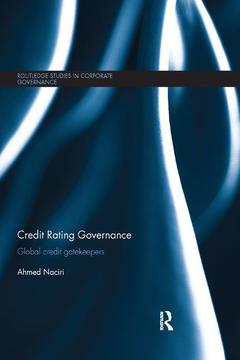Description
Credit Rating Governance
Global Credit Gatekeepers
Routledge Studies in Corporate Governance Series
Author: Naciri Ahmed
Language: English
Subjects for Credit Rating Governance:
Keywords
Default Prediction Models; NRSRO; credit rating agencies; IOSCO Code; governance; NRSRO Status; financial crisis; Dominion Bond Rating Service; risk management; investment banking; Credit Rating; Japan Credit Rating Agency; Hr Rating; Global Rating Market; Credit Rating Market; Credit Rating Activity; International Monetary Fund; Basel Iii Rule; Form NRSRO; Determining Credit Ratings; Fitch Ratings; Structured Finance Instruments; Credit Rating Industry; Fsb; Default Prediction; Mis; Improving Rating Accuracy; Effective Internal Control Structure; Default Risk Assessment
Publication date: 12-2019
· 15.6x23.4 cm · Paperback
Publication date: 01-2015
· 15.6x23.4 cm · Hardback
Description
/li>Contents
/li>Readership
/li>Biography
/li>
Credit rating agencies play an essential role in the modern financial system and are relied on by creditors and investors on the market. In the recent financial crisis, their power and reliability were often questioned, yet a simple rating downgrade could threaten to bankrupt a whole country.
This book examines the governance of credit rating agencies, as expressed by their ability to fairly, ethically and consistently assign higher rates to issuers having lesser default risks. However, factors such as the drive for increased revenue and market share, the inadequate business model, the inadequate methodology of assessing risk, opacity and inadequate internal monitoring have all been identified as critical governance failures for credit agencies. This book explores these issues, and proposes some potential solutions and improvements.
This will be of interest to researchers and advanced students of corporate finance, finance, financial economics, risk management, investment management, and banking.
Preface 1. Introduction to the World of Credit Rating 2. Credit Rating Agencies Who they are and What they do? 3. The Big 3, the Global Credit Market Gatekeepers 4. Credit Rating Agencies’ Methodologies, Metrics and Rating Accuracy 5. Ordinal Credit Ratings: The threat to rating accuracy 6. Credit Ratings Critics, Telling it like it is 7. Credit Rating Agencies External Monitoring 8. Credit Rating Agencies Internal Monitoring 9. Agencies Rating Quality Control Systems 10. The Chall 6, Shall they Present Serious Challenge to Big 3? 11. Critical perspective and concluding remarks
Ahmed Naciri is Professor at the School of Business at UQAM, Canada. His work has earned him the Award of Excellence from the Canadian Association of Administrative Sciences.
These books may interest you

A Century of Sovereign Ratings 94.94 €



